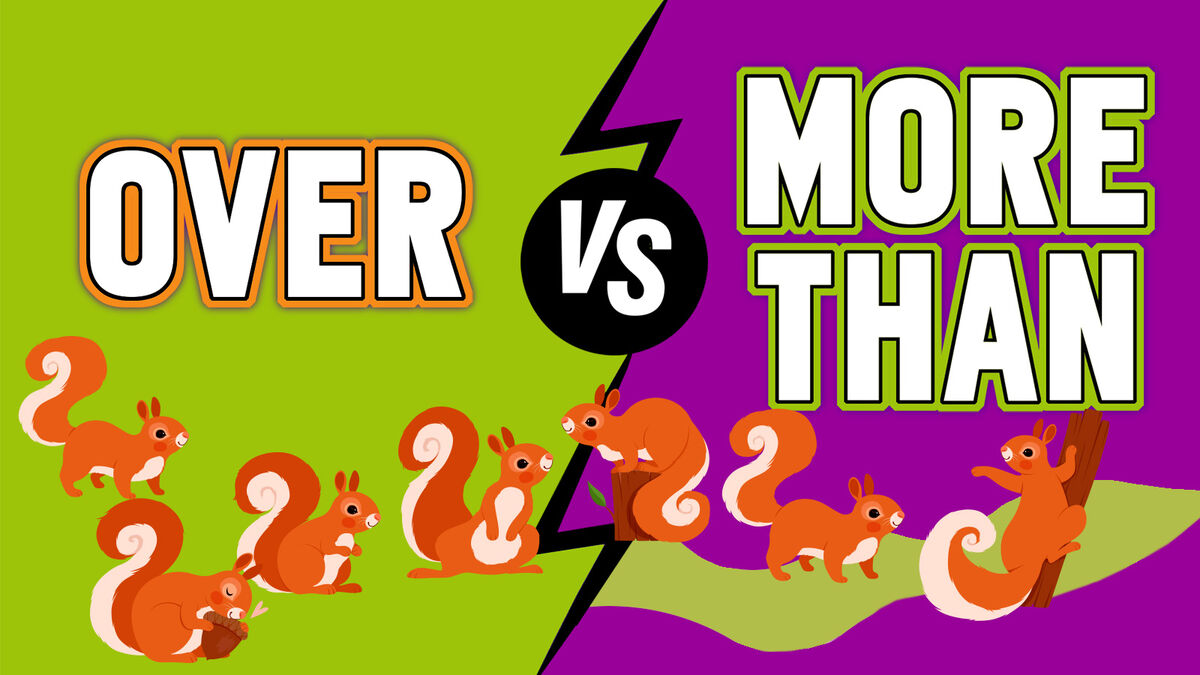
For years, writers and editors were careful not to use over when they meant more than. But, you may be surprised to learn that keeping these terms distinct from each other was never an official grammar rule. Learn whether you can use over and more than interchangeably – or whether you should still follow the old guideline.
Over and More Than Definitions
So which is correct: over or more than? Do you use over or more than for money? Can you use over when talking about numbers of people?
Editors prefer more than when discussing quantities because over is more commonly used as a preposition. When writers use over to indicate an amount over a specified number, some believe that it could be potentially confusing to readers.
Examples of More Than
More than can describe amounts of anything. It modifies nouns, including money, liquid, people, objects, or anything else that can be quantified.
For example:
- Uncle Harry makes more than $150,000 at his new job.
- I’ve counted more than 15 squirrels in this park.
- This car can travel more than 300 miles on one tank of gas.
- Is it possible to get more than 50 points on this project?
- It costs more than $10 to get into the fair.
- We’ve been together for more than six months now.
Examples of Over
Over is a preposition. It describes an object’s position as above or on top of something. Its meaning is usually literal, but when it's used to replace more than, it can mean figuratively “above” an upper limit.
Here are the same sentences with the word over:
- Uncle Harry makes over $150,000 at his new job.
- I’ve counted over 15 squirrels in this park.
- This car can travel over 300 miles on one tank of gas.
- Is it possible to get over 50 points on this project?
- It costs over $10 to get into the fair.
- We’ve been together for over six months now.
The only difference in these sentences is a less formal tone. More than is appropriate for formal writing or professional settings, while over is a more conversational choice.
Historical Usage
William Cullen Bryant was the editor-in-chief of the New York Evening Post for 50 years. In 1877, he instituted the rule that his writers could not use over in place of more than when talking about quantities. Even though Bryant's rule was not based on adherence to a style guide, the distinction between over and more than became common practice in American writing.
Modern Adaptation
In 2014, the AP Stylebook announced that using either over or more than to describe quantities is acceptable. Writers who preferred Bryant's traditional wording declared their displeasure with this announcement with the humorous headline “More Than My Dead Body!” Today, the matter of over and more than is a matter of personal preference, not style guidelines.
Are They Interchangeable?
You can use over when you are describing a quantity without obscuring understanding. However, it gets tricky when you use more as a modifier to compare something to something else.
For example:
- Shawna likes rain over she likes sunshine. (Incorrect)
Shawna likes rain more than she likes sunshine. (Correct) - I love you over I can say. (Incorrect)
I love you more than I can say. (Correct) - The gum costs over the candy bar. (Incorrect)
The gum costs more than the candy bar. (Correct)
These situations would not sound right with the word over. Additionally, sentences that use over as a preposition to describe physical positioning don’t sound right when replaced with more than.
For example:
- You’ll find the cabin just more than the bridge. (Incorrect)
You’ll find the cabin just over the bridge. (Correct) - The helicopter is hovering more than the house. (Incorrect)
The helicopter is hovering over the house. (Correct) - Karyn stores the potholders more than the stove. (Incorrect)
Karyn stores the potholders over the stove. (Correct)
Basically, if you’re describing a quantity that exceeds a limit, more than or over is fine. But, if you are comparing two nouns or phrases, stick with more than. Likewise, if you want to describe the location of something, use over.
More Tricky Distinctions
English is full of nuanced differences that are easy to mix up. Learn how to choose between many and much with a helpful article. Or, delve into words that sound the same with some examples of when to use of versus for.